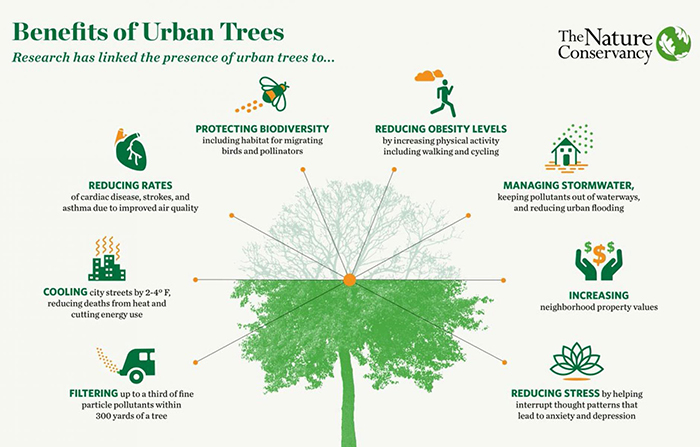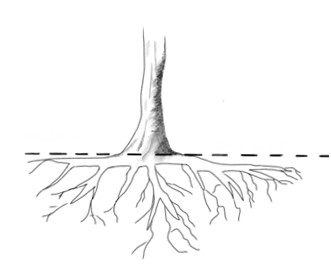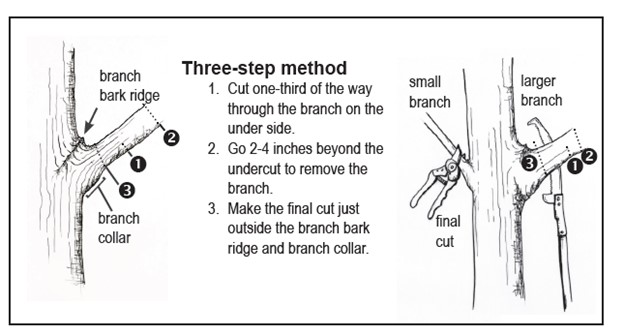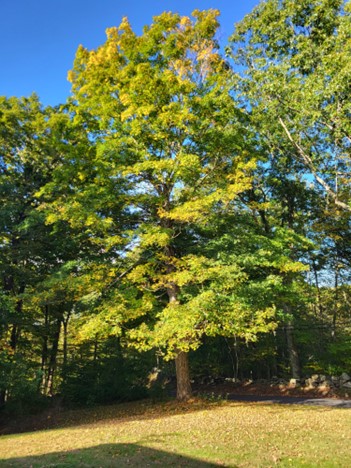Information on Yard Trees
What Is a Yard Tree?
Yard trees are the trees that grow on private property in landscaped or manicured settings. In many cases, they are planted for their landscape or ornamental value. Just like your house, yard trees require ongoing care and maintenance.
Yard trees are a critical component of Connecticut’s tree canopy, providing benefits such as reduced energy consumption and costs due to shading, increased property values, improved mental health, and much more.

The Connecticut Tree Owner’s Manual is a great resource on selecting, planting, and caring for young trees It will provide answers to these questions and more. There is also a Spanish language version of the Tree Owner’s Manual.
Commonly Asked Questions About Yard Trees
Where and how should I plant my tree?
How do I care for the trees in my yard?
How do I know if my trees are healthy?
Are there resources to help with the care of yard trees?
What Tree Should I Plant?
Consider planting native trees. You can find out more at the CT Native Tree and Shrub Availability list from UConn.
Before planting, you should consider testing soils to ensure that they are capable of sustaining the tree species you wish to plant. The Morton Arboretum has a publication outlining ideal soil conditions for new trees and both the Connecticut Agricultural Experiment Station and the UConn Coop Extension Service offer services to test the soil conditions on your property.
In determining which tree species to plant, you will want to consider the Right Tree Right Place concept, which encourages proper tree selection and planting. You may also wish to consult UConn's Plant Database for a guide specific to Connecticut's landscape.
Where and How Should I Plant My Tree?

Mulch or soil should not cover the base of the tree's trunk.
The depth at which a tree is planted is critical in its ability to survive. Oxygen is necessary for root growth and health, and a tree planted too deep will suffer or expire. Ensure the root flare of a tree is always visible above the soil, and that mulch applied in the vicinity is kept away from the base of the tree.

The dashed line indicates the ideal soil level after planting.
After planting, trees require watering. Some trees may require watering multiple times weekly during the warm season, and especially in summer and during droughts. The soil must dry out between watering. Constant moisture is likely to promote the growth of damaging bacteria and fungi.
How Do I Care for the Trees in my Yard?
Yard trees require ongoing care and maintenance. Early investments in planted trees can greatly reduce the need for costly interventions down the road.
Most natural pest and disease issues will become problematic if a tree is stressed by other factors, such as not enough light or water, too much light or water, excessive fertilizers, and improper planting practices. Putting the right tree in the right place with the right care will make your tree resilient. Pests and disease are a natural part of a tree's lifecycle, and healthy trees will not succumb. Trees can succumb to insects, fungi, or bacteria. The Plant Pest Handbook, prepared by the Connecticut Agricultural Experiment Station, is a great resource for identifying these issues and potential treatment options.
Caring for a tree in its first few years is critical. However, additional work will help better the structure of a tree long term. Your tree should ideally have one central leader. A ventral leader is the uppermost branch which determines the future trunk of the tree. Choose one leader and remove or reduce others that are competing. Remove crossing and rubbing branches and keep those that are well-spaced. Consult with a CT licensed arborist if you are unsure about your tree's structure.

Invasive species, like oriental bittersweet, commonly harm trees in Connecticut. The Connecticut Invasive Plant Working Group website provides more information about how to identify and manage invasive species.
How Do I Know If My Trees Are Healthy?

Tree at the edge of a yard. Photo credit: Chris Teter.
Symptoms of poor health in trees include missing bark or branches, leaf damage, or early leaf fall. If you notice potential tree health issues, contact a Connecticut licensed arborist.
Another possible resource is the Connecticut Master Gardener program through the UConn Extension. They may be able to help you diagnose an issue and will often host office hours during the growing season where you can bring in samples or pictures and discuss with someone in-person.
Are There Resources to Help with Care of Yard Trees?
The Connecticut Tree Owners Manual is a great place to start. A licensed arborist is an ideal resource for advice and help when caring for yard trees. For those looking for financial assistance, the Connecticut Green Bank provides programs for private residents and commercial properties. These programs provide low interest loans to support a variety of energy efficient measures including removal of dead/hazard trees and planting.
Can I Sell My Yard Trees?
Typically, sawmills listed in the Primary Producer section of our website do not find it economical or practical to accept yard trees. There are several reasons for this:
- Yard trees are often known to contain concrete, metal, or other materials which can cause extensive damage to sawmill blades.
- Most log trucks are capable of holding 30 or more logs and it is not cost-effective for trucks to transport single trees/logs.
- Logs must be at least 8'6" without a major branch or fork to have value as lumber. Keep in mind that this size is based on the trunk alone.
- Felling of yard trees can be complex given proximity to homes and structures, as well as aboveground and underground utilities. Paved driveways are unable to support the weight of heavy equipment used to transport logs.
The removal and processing of yard trees is most often at the expense of the homeowner, who can search for individuals with portable sawmills if they wish to process their own yard trees into usable wood products. Portable band mills use blades that are significantly cheaper and easier to change out than traditional circular sawmills. The Division of Forestry does not register or keep track of individuals with portable mills. When maintaining yard trees, it is best to work with a licensed Arborist.
Content last updated June 2025.

